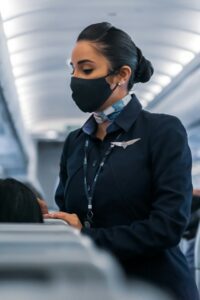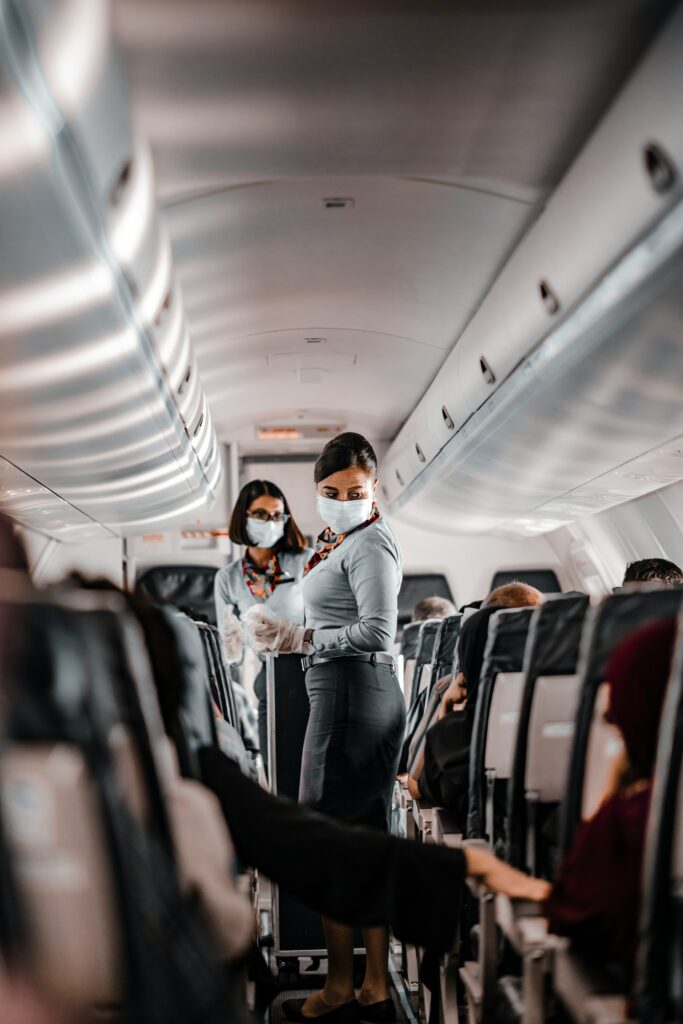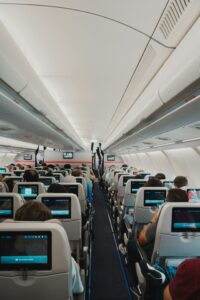 A flight attendant job is more than just a job for many individuals; it’s a way of life that offers opportunities for travel, adventure, and social interaction with people from various backgrounds. Flight attendant jobs in the United States are the public face of the airline industry, offering millions of customers traveling domestically and internationally comfort, safety, and service. This position combines emergency preparedness, customer service, and hospitality at 35,000 feet. Even though the work can be taxing due to long hours, time zone changes, and unforeseen delays, it also has special benefits like flexible scheduling, travel benefits, and the excitement of waking up in a new place every day. A flight attendant job in the USA offers a gateway to the globe, both professionally and personally, regardless of your preferences for the thrill of flying, helping others, or working in a fast-paced, dynamic workplace.
A flight attendant job is more than just a job for many individuals; it’s a way of life that offers opportunities for travel, adventure, and social interaction with people from various backgrounds. Flight attendant jobs in the United States are the public face of the airline industry, offering millions of customers traveling domestically and internationally comfort, safety, and service. This position combines emergency preparedness, customer service, and hospitality at 35,000 feet. Even though the work can be taxing due to long hours, time zone changes, and unforeseen delays, it also has special benefits like flexible scheduling, travel benefits, and the excitement of waking up in a new place every day. A flight attendant job in the USA offers a gateway to the globe, both professionally and personally, regardless of your preferences for the thrill of flying, helping others, or working in a fast-paced, dynamic workplace.
Read Also: American Airlines Careers
What Are Flight Attendant Jobs?
The security and comfort of airline passengers are the responsibility of flight attendants. They are capable of working on business or commercial aircraft. Information about the anticipated weather, journey duration, and passenger requirements is sent to the attendants before the flight. For passengers, these attendants serve as their main point of contact. They will respond to enquiries, allay worries, and speak with the pilot as required.
Additional duties for flight attendant jobs are helping travellers get on board, assisting travellers with luggage storage and seat selection, keeping an eye out for questionable conduct among passengers, helping people who have tiny children or significant medical needs, teaching travellers the proper safety protocols, and preparing the Cabin for landing and takeoff. Also, they supply food, beverages, pillows, headphones, and other amenities to travellers while they are in flight; Maintaining passenger composure in the face of delays or turbulence, and helping travellers in dire circumstances, assisting travellers in securely disembarking following a landing.
Read Also: Government Jobs in the USA (Hiring Now)
The Workplace
 For commercial, corporate, regional, or international airlines, flight attendants might work either full-time or part-time. Because airlines operate day and night, year-round, on holidays and weekends, they have to work unusual and long hours and schedules, such as being on call or showing up for work at the last minute. Although international flights may require flight attendants to work longer hours, the majority of airlines guarantee that they work no more than 12 hours per day.
For commercial, corporate, regional, or international airlines, flight attendants might work either full-time or part-time. Because airlines operate day and night, year-round, on holidays and weekends, they have to work unusual and long hours and schedules, such as being on call or showing up for work at the last minute. Although international flights may require flight attendants to work longer hours, the majority of airlines guarantee that they work no more than 12 hours per day.
Flight attendants are required by the FAA to take a minimum of nine hours off between shifts. They may spend many days away from home and frequently stay in motels in between flights. During their workdays, flight attendants spend some time in the air and some time on the ground getting ready for the next flight. While in flight, they collaborate with other crew members in the aircraft’s cabin. Because flight attendants must respond to any crises, endure air turbulence, and stand for extended periods, their work can occasionally be difficult.
Their Work Schedule
Particularly when they are first starting, flight attendants may have unpredictable schedules. Lines are what schedules are called. Flight attendant jobs compete for a new queue every month, and seniority determines which queue is chosen. New flight attendants are frequently on reserve, meaning they may only have a few hours to go to the airport and board their aircraft. This means they are available for any flights that require extra crew members. Reserve flight attendants typically receive 10 days off each month, whereas queue holders may receive 20 or more days. Each excursion ranges in length from a short round-trip where you return right away to a two-, three-, or four-day trip where you spend a lot of time out of town. Layovers typically last 12 hours. There are hotels available for layovers.
Read Also: Visa Sponsorship Opportunities in the U.S.A 2025
Requirements for Flight Attendant Jobs
You must be at least 18 or 21 years old, depending on the state or business, have a valid passport, have at least 20/40 vision, and pass a background check and drug test to be recruited as a flight attendant. Meeting an airline’s height criteria and passing a medical exam are possible further requirements. The following are additional prerequisites for having a flight attendant job:
-
Education
Most flight attendants have a GED or at least a high school degree. Candidates having an associate’s or bachelor’s degree in fields like these may be preferred by certain airlines. Greetings and hospitality, publicity, Communication, regarding Tourism Business, and Nursing. Other options include enrolling in flight attendant school. It could be beneficial to enrol in foreign language classes if you want to work on international flights.
-
Training
For many flight attendant Jobs, gaining customer service skills requires a year or two of work experience. They undergo three to six weeks, and occasionally up to six months, of airline-provided training after being employed. In a Flight attendant job, training is received on safety and emergency protocols, first aid, flight rules, and job responsibilities during this time. Additionally, they practise flying to put their newly acquired knowledge and abilities to use. To obtain their Federal Aviation Administration (FAA) certification, all flight attendants must complete this first training. The airline company may need this position to complete further job training.
-
Accreditations
One of the following certifications is necessary for flight attendants: the FAA Demonstrated Proficiency Certificate. Flight attendants must obtain this certificate after finishing their on-the-job training and passing an examination. For every kind of aircraft they operate on, flight attendants undergo training and certification. To maintain their certification, they also undergo annual training.
-
Skills
Flight attendants typically have good interpersonal and customer service skills and love working with people. The opportunity to visit other places makes the variable hours worthwhile for many flight attendants, so think about whether the lengthy and irregular hours are a suitable fit for your lifestyle. The following are some soft skills that prospective flight attendants can acquire:
-
Attention to detail
Flight attendants keep an eye out for any problems or questionable behaviour from passengers. They take great care to ensure that both people and equipment are safe. An individual’s journey can be drastically altered, and not in a positive way, by omitting a single letter in their name, failing to confirm a hotel reservation, or failing to notice a visa requirement. On the other hand, paying attention to the small details, such as dietary restrictions, time zones, or cultural traditions, can make an ordinary event memorable. Additionally, being meticulous fosters trust with employers, coworkers, and clients. It demonstrates professionalism, lowers expensive errors, and guarantees more efficient operations in a field where timeliness, precision, and first impressions are crucial.
-
Communication
Those in this position can interact with passengers and crew and provide safety demonstrations straightforwardly and confidently. In addition, they are polite and have excellent listening abilities. Travel jobs frequently expose you to individuals from various backgrounds, cultures, and languages, each with their requirements and expectations. You may manage expectations, give clear instructions, address problems, and ensure that each passenger feels heard and taken care of by having effective communication. Nevertheless, listening is just as important as speaking. It might make all the difference between a difficult trip and a fun, stress-free one to know the traveler’s preferences or worries.
-
 Customer service
Customer service
A flight attendant’s duties may include assisting customers with luggage storage in the overhead bins, answering enquiries, and guiding travellers to their seats. To guarantee that passengers have a pleasant flight, they are kind and patient. It can be stressful to travel. Plans alter, delays occur, and visitors may experience fatigue or confusion in strange settings. Strong customer service abilities are useful in this situation. An unpleasant situation can be swiftly transformed into a pleasant memory by being approachable, offering assistance, or just listening. In travel, providing excellent customer service also entails having patience, empathy, and a solution-focused mindset. Travellers frequently come to you first with queries, grievances, or complaints; how you handle these situations can determine how people perceive not only you but the entire business or location.
-
Stamina
Flight attendants frequently put in lengthy shifts, deal with difficult passengers, and move bulky objects like luggage and service carts. In contrast to regular 9–5 occupations, travel jobs frequently involve long shifts, erratic scheduling, and a lot of traveling. While being positive and professional, you may work late at night one day and early in the morning the following day. It takes both mental and physical endurance to keep up with that speed. Having stamina is more than just enduring exhaustion; it means being fully present, remaining vigilant, and being able to offer every customer or guest your all, regardless of the time or level of fatigue. It’s about sustaining vigour, excitement, and an optimistic outlook during the trip.
-
Efficiency
To ensure an on-time departure, flight attendants operate swiftly and effectively to finish preflight activities. Travel jobs frequently require multitasking, problem-solving, and maintaining composure under duress. Being efficient entails not just working hard but also working smart, which includes prioritising tasks, being flexible, and maintaining confidence even in the face of last-minute changes to plans. Travellers can sense when you are doing your job well. Trust will develop, stress will decrease, and things will run more smoothly. Additionally, your dependability and capacity for independent action aid your employer and team behind the scenes.
-
Leadership
Flight attendants assume responsibility and act quickly to direct passengers to safety in an emergency. Excellent leaders in the travel sector can act swiftly, solve issues, and maintain everyone’s attention and confidence even in the face of unforeseen circumstances or changes in plans. They are the ones to whom people turn for guidance, assistance, and answers. Having the ability to unite people is another aspect of leadership. You collaborate with teams from diverse backgrounds and deal with clients from around the globe in several travel-related positions. Clear communication, attentive listening, and establishing an example of positivity that others want to follow are all components of leadership.
Read Also: Side Jobs in the USA- Hiring Immediately
Why Work Flight Attendant Jobs in the USA?
The flight attendants’ job includes Outstanding travel benefits provided to them. Employees and their spouses, kids, and other family members may be eligible for complimentary standby flights from some airlines. The ticket is usually at a discount for those who cannot fly for free. There are frequently discounts on cruises, hotels, and rental vehicles as well.
How to Become a Flight Attendant
-
Finish your studies
You must have at least a high school degree or a GED to work as a flight attendant. A bachelor’s degree can improve your employability, but it is not necessary. Degrees in marketing, hospitality, tourism, public relations, or communication are the most pertinent.
-
Acquire relevant job experience
Only the most qualified applicants make it past the first interview for the highly sought-after flight attendant positions. Your resume will be strengthened by relevant work experience. A minimum of two years of experience in sales, customer service, or hospitality is important for many airlines. Airlines seek employment experience that demonstrates your ability to work overtime, stand for extended periods, solve problems, and deliver exceptional customer service.
-
Get your resume ready and send it in
Create a compelling CV that emphasises your abilities in customer service. Highlight any volunteer or professional experience that improved your capacity to deal with difficult clients. Emphasise jobs where you worked overtime or stood for extended periods to show that you are physically fit to handle the responsibilities of a flight attendant. Only a few hours may pass before top airlines accept resumes. When a flight attendant position becomes available, have your resume ready to go so you can take immediate action.
-
Make it through the interview for a flight attendant job
Before starting training, prospective flight attendants need to pass their interviews. This involves a background check and a drug test. The height and weight of flight attendants must be proportionate, and they must be tall enough to reach overhead bins. You must have exceptional health and be able to adjust your vision to 20/40 or better. A lot of employers assess prospective flight attendants via video interviews. These might be live or not. When doing a video interview, pay close attention to your surroundings and ensure that the background is peaceful and orderly. For a crisp, steady shot, position the camera at eye level and in a sturdy position. Because airlines want a professional image, conservative clothing is ideal. Most prohibit conspicuous tattoos, unnaturally coloured hair, and facial piercings.
-
Finish the airline’s training course
Flight attendants receive training from airlines that lasts three to six weeks. Throughout the program, you will normally spend eight hours a day in training. This training equips you to handle in-flight emergencies, make public address announcements, use airport codes, and carry out regular job obligations. As part of the curriculum, you will conduct about four supervised test flights. To work as a flight attendant, you have to complete your training successfully. A minimum grade of 90% is mandatory for the majority of airlines.
-
Obtain your FAA Demonstrated Proficiency Certificate
Following training, your business will apply to the Federal Aviation Administration for your Certificate of Demonstrated Proficiency. Each type of aircraft you are certified to work with requires a different certificate. You have to finish yearly training to keep your certification.
Read Also: US Postal Service Jobs
Outlook for Flight Attendant Jobs
Flight attendant jobs are expected to increase by 21%, according to the US Bureau of Labor Statistics (BLS). Compared to the average occupation, this increase is significantly faster. This might lead to 18,100 employment opportunities per year. A flight attendant makes, on average, $39,321 annually nationwide. Your experience, education, job, and geography can all affect your pay. On average, flight attendants make $16.71 per hour. From $7.25 to $41.05 per hour, salaries can vary. The main elements influencing a flight attendant’s pay are seniority and experience.
Conclusion
A lifestyle full of movement, education, and connection is what travel jobs in the USA offer in addition to a salary. Guiding tourists through picturesque scenery, assisting passengers in the air, or organising behind-the-scenes experiences are just a few of the opportunities these vocations provide to travel, interact with a variety of people, and develop in ways that few other occupations can. The rewards are equally as rich as the job, which can be fast-paced and hard. They include priceless life and career skills as well as remarkable experiences. For people who love to serve others, have a strong desire for adventure, and flourish in dynamic settings, travel jobs in the USA are more than simply jobs; they are experiences in and of themselves.

 Customer service
Customer service